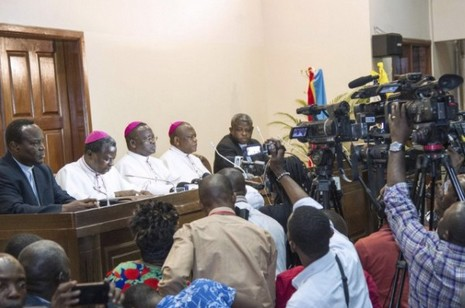Stand off deepens between DR Congo bishops and government
It is the right and duty of all to fight anything that could compromise the future, say bishops
Photo: National Episcopal Conference of the Congo president Archbishop Marcel Utembi and other Catholic bishops together with leaders from the opposition, government, civil society and dozens of journalists at the Interdiocesan Center in Kinshasa on January 1, 2018.
At its extraordinary plenary assembly Feb. 15-17, the National Episcopal Conference of the Congo addressed a series of issues arising from the peaceful protest marches organized by the Lay Coordination Committee.
The Lay Coordination Committee, which is an officially recognized association of lay Catholics from Kinshasa Archdiocese, launched a series of protests against the Joseph Kabila government in December 2017.
It also condemned violations of the “St. Sylvester Agreement” reached between the government and the opposition under the auspices of the Catholic Church in December 2016 in an effort to resolve the current political crisis in the Congo.
In their final declaration published on Feb. 19, the Congo bishops again gave its backing to the Lay Coordination Committee, calling for an end to the legal pursuits and threats to which its members have been subject.
They also called on the government to annul “the edicts prohibiting peaceful demonstrations” and to launch legal proceedings “against those who committed criminal acts during the marches organized by the Lay Coordination Committee.”
The bishops also demanded that the government implement “an appropriate framework to ensure that the peaceful marches can go ahead, as other countries have done.”
In addition, they called on the Congolese people “to remain upright and vigilant,” to take control of their own destiny, “particularly by prayer and initiatives likely to peacefully block any attempt to confiscate or take power by non-democratic and anti-constitutional means.”
In the bishops’ view, “it is a right and a duty of all to fight anything that could compromise the future.”
With a third peaceful march planned for Feb. 25, the bishops’ position has great significance since a number of groups have called for an end to the marches in the wake of the 15 deaths that occurred during earlier protests.
In their statement, the Congolese bishops also condemned the continued hounding of the church.
“Why so many deaths, wounded, arrests, abductions, attacks on parishes and ecclesiastical communities, humiliations, torture, intimidation, profanations of churches, prohibitions on prayer?” they asked.
“What crimes have been committed by these Congolese Christians and citizens, who have peacefully demanded the integral implementation of the Dec. 31 2016 agreement?”
“We strongly condemn the bloody violence used to repress the two marches,” they said.
The Congolese bishops’ conference also noted that the international community has confirmed the existence of a “campaign of intoxication and disinformation” against the church, particularly against the archbishop of Kinshasa, Cardinal Laurent Monsengwo Pasinya.
“With our unbreakable faith in Jesus Christ, king of the universe, and remaining faithful to our prophetic mission, we will never abandon our commitment to the future of the rule of law in the Democratic Republic of the Congo,” the bishops said.
The Congolese bishops also expressed concern over the planned use of “voting machines” at the elections planned for Dec. 23.
Rumors have been circulating for several weeks in the DR Congo about the introduction of an electronic voting system.
Corneille Nangaa, president of the Congolese Election Commission (CENI) was forced to deny the rumors in an address to the UN Security Council on Dec. 14.
In their statement, the Congolese bishops called on CENI to “remove any ambiguity and suspicion regarding the ‘voting machines’ by accepting for them to be certified by national and international experts.”
The National Episcopal Conference of the Congo also expressed concern over the “zones of insecurity in various provinces,” citing the Greater Kasai region, North Kivu and South Kivu, Ituri where “the presence of assailants who sow death and destruction, has raised fears of a plan to occupy and balkanize the region, which has been constantly condemned.”
They also warned of the presence of “foreign farmers” establishing themselves in the provinces of Kwango and Kwilu.
“At this stage of the electoral process, it is right to ask, who is benefiting from the destabilization of the country?” they asked.
By Lucie Sarr – Congo
Published on La Croix International.


